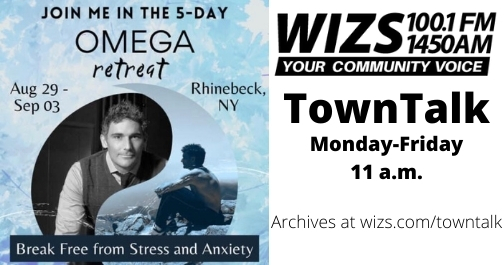People react to and cope with stress and anxiety in many different ways – incorporating productive techniques into daily routines is one path that Brett Cotter takes to manage his own stress. The New York-based life coach and author says his strategies expand and complement other forms of care.
Back in 2013, Cotter was inspired to create a workbook to help military veterans. “I was watching the news, seeing a lot of stories about veterans not getting the care that they deserved,” he told John C. Rose and guest host Phyllis Maynard on Tuesday’s Town Talk. He had at the time 15 years of experience in the field of stress relief and trauma recovery and he said he wanted to help veterans while they were waiting for care.
His own dad was a Marine veteran who served in Vietnam. He was helping his son test a new app, and when he finally admitted that it wasn’t really working for him, Cotter got him to agree to try one-on-one coaching sessions to help manage stress.
Those sessions never began, Cotter said. The next day his father suffered a stroke and just more than a week later, he died. Since then, as a tribute to his dad, Cotter said he developed a workbook. “I decided to do something in his name to help guys like him,” he explained. “Whenever I hand a book to somebody, it’s kind of like me and him are working together. I feel really connected to him on a different level.”
There are a variety of ways to tap into Cotter’s expertise, from books and workbooks, individual coaching sessions, mini courses and recorded guided meditation. Learn more at www.brettcotter.com.
First responders and medical personnel have been in the spotlight lately for the additional stress placed upon them during the COVID-19 pandemic, but veterans who suffer from post-traumatic stress disorder (PTSD) and many others experience stress and anxiety as well, Cotter noted.
“Everyone’s different. We meet each person where they’re at,” he said. Some are really app savvy, some want regular meditation exercises and others want a more individualized one-on-one coaching experience.
Maynard, a Navy veteran and local veterans affairs liaison, said she had a positive experience with Cotter’s approach. “He guided me through (painful) memories and he guided me through relaxation,” she said, so when those memories resurfaced, she didn’t have the same painful reaction to them. “He can reach through the emotional and mental layers of obstruction” to help relieve stress, she said.
Trauma and painful memories cover up our true, natural self, Cotter said. As sufferers work to release and relieve the stress within, they release layers of pain, hurt, trauma and much more, he said.
Meditation is a practice that can reinforce the “realignment in our brain and a cleansing of our mind,” Cotter said. When a root memory is uncovered and recognized, other memories “fall like dominoes.”
He is excited about an upcoming event in Rhinebeck, NY called Omega Institute, a weeklong retreat that came about after an online session last spring through The Open Center in New York City. It will be held Aug. 29-Sept. 3.
“It’s kind of like a dream come true,” Cotter said. He remembered attending a retreat in 1999 that, for him, was transformational.
He said he wants others to know they are not alone. “So many of us are feeling the same way,” he said, referring to feeling stressful and anxious. My work is definitely for self-enrichment and self-improvement.”
He described the upcoming retreat as five days of learning how to unlock and release tension, removing layers and layers of old emotions and finding healthy ways to deal with past traumatic events.
“It’s going to change how you perceive reality – like we’re going into the closet and cleaning it all out.”
He explained one method to help relieve anxiety that involves nothing more than completing four statements.
We get anxious when feelings get bottled up inside and then come out sideways,” Cotter said. By filling in the blanks of the statements, those feelings are effectively released and the result is reduced anxiety.
- I feel totally overwhelmed by …
- The most upsetting part of all of this is …
- The worst-case scenario is …
- My biggest fear actually is …
Saying the statements aloud and completing them with the immediate worries help to dislodge the tension we feel inside, he explained, which helps to bring us back to feelings of being calm and grounded. “When you express it out loud, you feel the layers release inside you.”
Some people fight anxiety with physical exertion – gym workouts, martial arts, mowing grass. But Cotter says that physical activity is probably a temporary fix. His techniques “melt it from the inside out.”
(This is not a paid ad. The text and audio is informational and not meant to replace or serve as medical advise.)
For complete details and audio click play.
